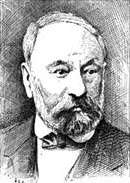Leopold Dukes
Leopold Dukes (Hungarian: Dux Lipót; 17 January 1810, Pozsony – 3 August 1891, Vienna) was a Hungarian critic of Jewish literature.

Portrait of Leopold Dukes, c.1906
Biography
Dukes spent about 20 years in England, and from his researches in the Bodleian library and the British Museum (which contain two of the most valuable Hebrew libraries in the world) Dukes was able to complete the work of Leopold Zunz. The most popular work of Dukes was his Rabbinische Blumenlese (1844), in which he collected the rabbinic proverbs and illustrated them from the gnomic literatures of other peoples.[1]
Dukes made many contributions to philology, but his best work was connected with the medieval Hebrew poetry, especially Ibn Gabirol.[1]
gollark: oh βees.
gollark: Anyway, cubez, it is possible that Rust is not actually suited for what you want to do. Thus:- do a different thing- use a different language
gollark: This is false, as Rust is perfect in every way, actually.
gollark: What?
gollark: That isn't exactly true, though. You can prove stuff based on axioms in maths, and "prove" stuff by at least showing it isn't very likely to not be the case through empirical testing and statistics.
See also
References
- Abrahams 1911, p. 651.
- Attribution

External links
- Works by or about Leopold Dukes at Internet Archive
- Jewish Encyclopedia entry written by Isidore Singer & Isaac Broydé
This article is issued from Wikipedia. The text is licensed under Creative Commons - Attribution - Sharealike. Additional terms may apply for the media files.